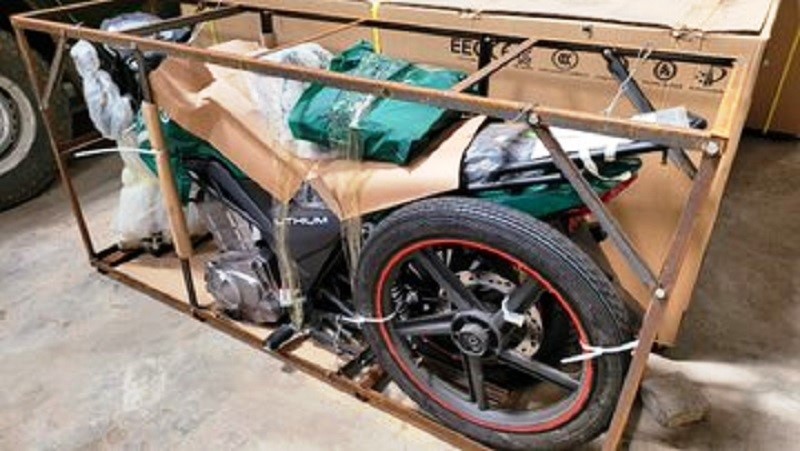
It was a sight to behold this morning as forty-nine motorcycles made little noise as they meandered into a section of Karura Forest. To welcome the motorcycles within the green background were representatives at the UN Environment Programme (UNEP), government officials and business leaders and environmental lovers who all launched the pilot electric bikes.
Following the pilot phase in four locations in Kenya, the project is expected to expand in an effort to reduce air pollution, improve national energy security and create green jobs. Speaking to Kate Kole representing the Optiven Foundation, Joyce Msuya, UNEP Deputy Executive Director advised that Kenya’s electricity is very green in 2019 with more than 80% was generated by hydro, solar, geothermal, and wind.
Shifting to electric bikes in Kenya, Rwanda, Uganda and elsewhere will reduce costs, air pollution and Greenhouse Gas Emissions, as well as create jobs. Kisumu Governor, Professor Peter Anyang’ Nyong’o advised that Electric motorcycles not only mitigate against this health hazard but also help reduce noise pollution that the rampant increase of petroleum powered motorbikes currently causes in our cities.”
And the community in Karura also benefitted from the electric bike. John Chege, infrastructure coordinator from Friends of Karura Forest said, “, the bike will help me move swiftly through the vast forest of over 1000 hectares in a very short period. At first, I was nervous about having to charge it, but now I got used to it.
Since it is fast and emits no noise and air pollution like the diesel motor, they allow us to provide better security in the forest and tackle one of Nairobi’s worst environmental problems.” The pilot aims to help policy makers assess the barriers in uptake of the much-needed technological shift towards electric bikes, and to demonstrate that the shift is feasible and within reach. The pilot test is based on a study implemented by the Energy and Petroleum Regulatory Authority, the University of Nairobi, and Sustainable Transport Africa.
The pilot includes a host of local partners, including ministries, and national and sub-national authorities, and uses bikes donated by Shenzhen Shenling Car Company Limited (TAILG). It will last 6-12 months and is replicated in Uganda, Ethiopia, the Philippines, Thailand and Viet Nam.
The overarching project, “Integrating Electric 2&3 Wheelers into Existing Urban Transport Modes in Developing and Transitional Countries” is supported by UNEP with funding from the International Climate Initiative (IKI) of the German Ministry for the Environment.
The packaging of the electric motorcycle at Karura Forest. The project is sponsored by UNEP under its energy economic stimulus. A global leapfrog to electric vehicles, already underway in countries like Norway and China, is essential to curb carbon dioxide emissions.
Transportation contributes approximately one-quarter of all energy related CO2 emissions. By 2050 it is likely to reach one-third, when the global number of passenger cars is projected to more than double. This growth is expected mostly in low-income countries, where there are rarely any vehicle emissions standards. Scaling up the transition to electric mobility will require investments in battery charging infrastructure.
Kenya’s electric power generation capacity is sufficient to support the charging infrastructure. However, while demand for motorcycles is high, particularly in rural areas, distribution networks are inadequate. However, this challenge may be tackled by using solar energy, setting up charging stations, consulting boda-boda operators and using lithium ion batteries.
UNEP’s Electric Mobility (eMob) Programme promotes the transition of low-income countries to zero emission vehicles, in line with the UN Environment Assembly’s Air Quality Resolution and the Paris Agreement.
Notes
About GoGreenNaOptiven
The GoGreenNaOptiven is an initiative of the Optiven Foundation that seeks to advocate for a environmental protection through greening of our world. Located in Kenya, the initiative has had a footprint in Kajiado and Murang’a counties where it has grown a number of trees. In addition, the initiative has been at the center of green lifestyle within the Optiven Real Estate projects.
About UNEP’s Electric Mobility Programme
The e-Mobility programme is currently the only global programme that supports electric mobility for developing and transitional countries. It supports over 50 countries and cities to introduce electric buses, cars and two- and three-wheelers.
About the United Nations Environment Programme (UNEP)
UNEP is the leading global voice on the environment. It provides leadership and encourages partnership in caring for the environment by inspiring, informing and enabling nations and peoples to improve their quality of life without compromising that of future generations.
To be a part of the Transformation
- Call Us: +254 718 776033
- Email: info@optivenfoundation.org





